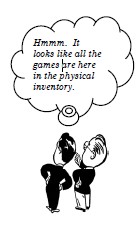Inventory
A person might be provided with the opportunity to steal—even someone the organization members have known and trusted all their lives—if the organization does not conduct a physical inventory every month.
Most gambling-related theft and fraud can be prevented if the organization follows an effective system of internal controls. The examples below describe how poor internal controls for inventory and deposits may result in a fund loss for an organization.
The Case of the “Non-Shrinking” Inventory
- An organization authorized the lead pull-tab seller at their site to order more paper pull-tab games as needed and to decide which games the other sellers were to put into play.
- Occasionally, the lead seller would put a game in play at the beginning of her shift and then remove the game from play at the end of her shift. Then she’d put the cash, winning tickets, prize receipts, flare, and any unsold tickets all in the original box the game came in and take it home.
- Once home, the cash went in her purse and the rest of the items, except the box, went in the garbage. She carefully closed the box and ran it through a shrink wrap machine so that it looked like it had never been opened. Then she brought the box back to the site and put it with the other unopened games.
- When the CEO conducted the physical inventory at the end of each month, she didn’t notice that some of the “unopened” games on the shelf were actually empty.
- Over time, the number of “unplayed” games in inventory doubled and then tripled. When the lead pull-tab seller was hospitalized after a car accident, the gambling manager decided to put into play one of the games that had been in inventory for over a year. When he lifted up the game box, he knew the organization had been duped.
| Solution: The gambling manager should have become suspicious when the number of games in inventory kept increasing month after month. When delegating responsibility, it’s still important to closely monitor all aspects of the gambling operation. |
 |
The “Perfect but Not So Perfect Records” Case
An organization kept what seemed to be excellent perpetual inventory records, but still experienced a theft of unplayed paper pull-tab games.
- The organization provided invoices to its accountant for every paper pull-tab game purchased. The Schedule B2 reports listed every game closed. This information was used to produce the perpetual inventory record.
- The organization did not conduct a monthly physical inventory in which an employee, a member, or a volunteer visited each of the sites to verify that the games listed on the perpetual inventory were actually located at each premises.
- The organization did not discover until a year later that over 20 games listed in inventory at one site were missing. Apparently, the games had been played at the site, no deposit for the games had been made, and the closed games had been destroyed.
Solution: If the organization had completed the required on-site physical inventory each month, the theft would have been discovered immediately and a $10,000 fund loss could have been avoided or lessened.
